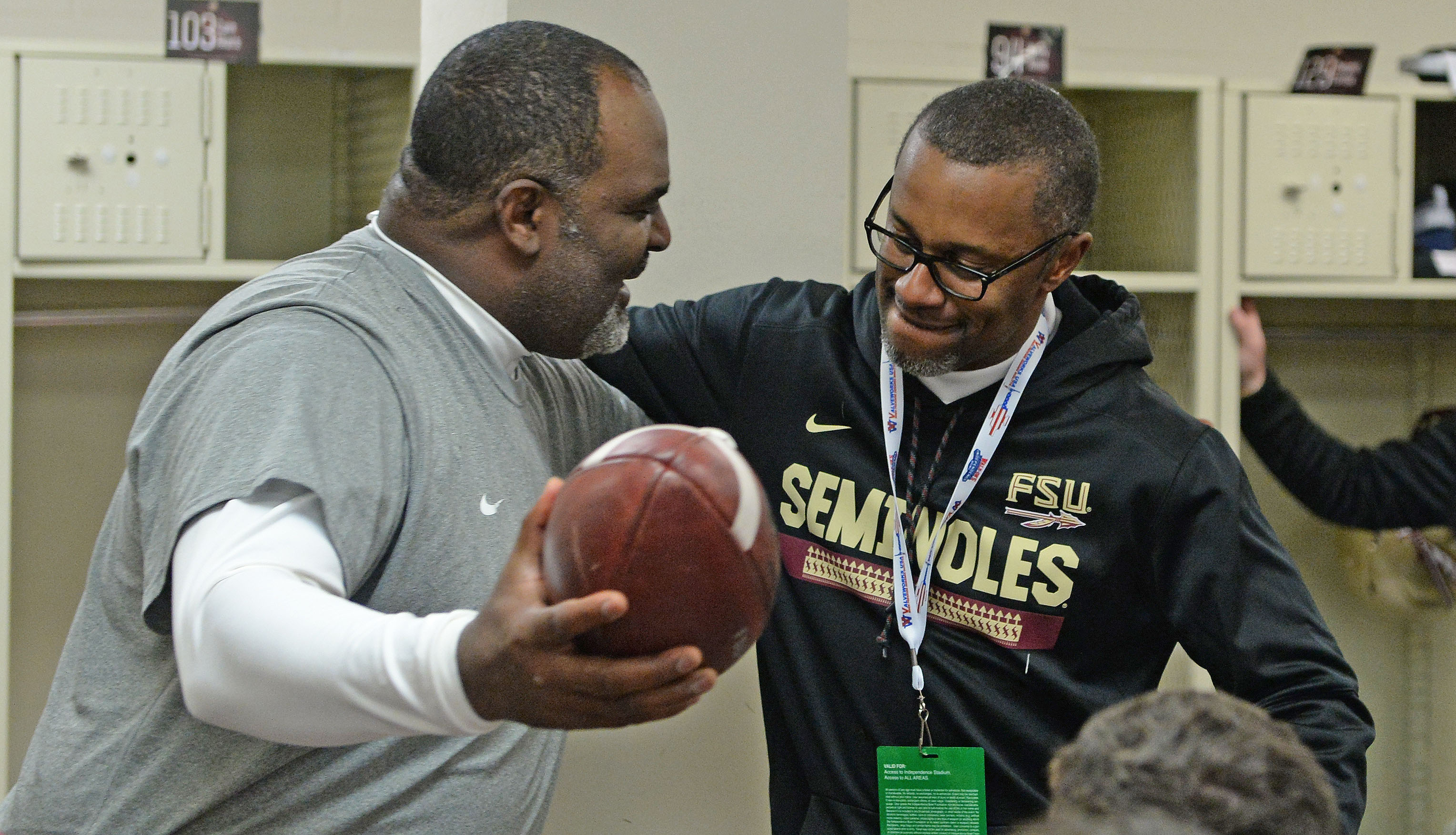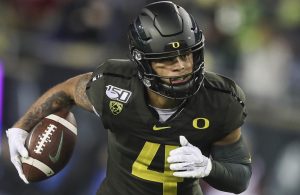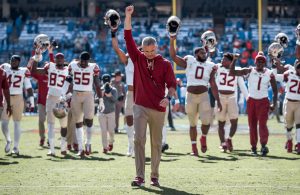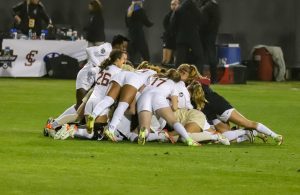- Sunday Seminole Summary: FSU Football Adds Pair of WR Transfers
- Sunday Seminole Summary: FSU Football Exits ESD With Top-15 Class
- Sunday Seminole Summary: FSU Soccer Tops BYU for Third National Championship
- Sunday Seminole Summary: FSU Soccer Advances to National Championship Match
- Seminole Sunday Summary: FSU Soccer Heads Back to College Cup
- Seminole Sunday Summary: FSU Soccer Reaches Sweet 16; Football Tops Boston College
- Seminole Sunday Summary: FSU Soccer Wins ACC, Advances to Second Round of NCAA Tournament; FSU Football Rallies Past Miami
- Seminole Sunday Summary: FSU Soccer Tops Wake on OT to Advance to ACC Final
- Seminole Sunday Summary: FSU Football Crushes UMass for Third Straight Win
- Seminole Sunday Summary: FSU Soccer Stays Perfect with Pair of Wins
What Each New Member of Taggart’s Staff Brings to FSU
- By Clint Eiland
- Updated: January 17, 2018
 Mitch White/FSU athletics
Mitch White/FSU athleticsTuesday night revealed that the almost brand new Florida State football staff was finally completed. The hires of Walt Bell and David Kelly ended one of the more anticipated staff searches in the past couple of years. The Seminoles will step on to the field against Virginia Tech on Labor Day with a radically different group of men.
It’s hard to keep up with the hires when they span over the course of a month. Plenty of names get tossed around but only a small group of them actually get the job. We here at The Daily Nole understand how difficult it can be to get solid information about coaches that you might not have heard of until this past week.
All 10 assistant coaching hires have been listed below, along with what each brings to the program. There’s no sunshine pumping here: these are legitimate opinions on the staff as a whole, good and bad.
Telly Lockette
What He Brings: Pipeline to South Florida; surprise grabs out west
Lockette being named the tight ends coach was a bit of a surprise, but it makes sense when looking at who he is replacing. Tim Brewster was an excellent recruiter and decent coach. Lockette’s focus will be on recruiting the South Florida area, and he’s one of the best at it. Lockette taught guys like Devonta Freeman, Joe Yearby, and Dalvin Cook as the head coach of Miami Central High School before departing for South Florida in 2013. He’s got relationships built in South Florida that pay dividends years down the road. Florida State will continue its success in that region as long as Lockette is trying.
Where Lockette could surprise is the recruiting out west. He was the running backs coach for Oregon State from 2014-17 and was able to form relationships with high profile players in the next couple of classes. A recent commitment from 4-star California tight end Camren McDonald provides evidence for this. It would not be shocking to see Lockette play a big role in getting more talent from the region.
Donte Pimpleton
What He Brings: Mainly recruiting
It wasn’t clear for a while what Pimpleton would actually coach at FSU. His previous positions were wide receivers at Western Kentucky, and running backs at USF and Oregon. Running backs coach is a position where the actual “coaching” is not totally essential to running success. Obviously the coach needs to know what he’s doing and teach proper form/technique to his backs, but most great players come in with that knowledge already.
In the end, it doesn’t matter much because Pimpleton was brought on mainly for his recruiting. While in Eugene, Pimpleton had his footprint across the nation, getting recruits from California, North Carolina, and Florida. He’s young and versatile — two deadly traits when trying to convince athletes to come to your school.
Raymond Woodie
What He Brings: Great recruiter; OK linebacker coach; bad special teams coach
If Taggart is the No. 1 recruiter on staff, Woodie has the potential to be second in command. While at USF from 2013-16, Woodie had a hand in at least 30 different recruitments. A group of them turned out to be some of the Bulls’ best players the past few years: Marlon Mack, D’Ernest Johnson, Auggie Sanchez, Deatrick Nichols and Mitchell Wilcox to name a few. He didn’t get much of a chance to establish a rapport out west, so coming back to Florida allows him to return to more familiar territory.
As a linebacker coach, it’s not entirely clear how good he actually is. Oregon fans were timid at his departure. It seemed that he was OK, but nothing special — though judging linebacker play is more difficult. With a good defensive coordinator at the helm, his units did their job and were rarely a weakness. Where Woodie certainly failed was as a special teams coach. His Oregon special teams ranked 92nd, according to S&P+, this past season and were regarded as a hindrance to the team. Taggart picked up on this and removed that position from his title.
Alonzo Hampton
What He Brings: Familiarity with Taggart; actual defensive backs coaching unclear
Hampton is the most questionable of all the hires made. He doesn’t seem to have much of a history with producing good defensive backs, and he’s only coached them for five total years at the Division I level. His recruiting seems fairly unknown as well, but that’s probably because he was rarely the main recruiter for any targets.
Hampton was with Taggart at Western Kentucky, USF, and Oregon, so he appears to be a coach that simply knows how he likes to run his programs. Every head coach has guys like Hampton. The good news for worried fans is that defensive coordinator Harlon Barnett will be the main coach for defensive backs, since that’s where he’s been focused for most of his career.
Greg Frey
What He Brings: Great fit for Taggart’s system; proven talent development
Three words are essential to understanding why Frey was hired: “zone blocking based scheme”. Willie Taggart has adjusted his offensive style in various ways at every school he’s coached. During his Oregon stop, Taggart shifted towards outside zone runs instead of his usual power offense that saw success at USF — mainly because he had the linemen for the former. Hiring Greg Frey means that Taggart’s offense will look more like Oregon than USF. It’s still going to be focused on the run and trying to get more mobile linemen on the outside.
The past decade of Frey’s career at Michigan and Indiana show a coach that consistently get results. Some notable names under his tenure include Dan Feeney (first team All-Big Ten), Jason Spriggs (second round pick), and David Molk (Rimington Trophy winner). It was under Frey’s lines that Indiana’s offense ranked in the top 25 during the early 2010s. Quite simply, he is a good coach at a position that doesn’t get the notoriety it deserves. Frey also brings two assets that former coach Rick Trickett did not: youth and recruiting prowess. They might not be the focus, but Frey can only help in this regard.
Harlon Barnett
What He Brings: High potential; proven defensive back success
Though his name was less publicized during the search, Barnett was still regarded as an up-and-comer in the defensive coaching ranks. Ever since 2004, he’s been the defensive backs coach for noted defensive mastermind Mark Dantonio. In 2015, he was promoted to co-defensive coordinator and assistant head coach. In two of those three seasons, the Spartans’ defense was top 15 in the S&P rankings, including a No. 4 finish this past year. Florida State is taking a slight risk and hoping that his first year as a sole defensive coordinator will not prove too daunting a task. Regardless of the risk, Barnett’s history indicates that he has a high ceiling that he can achieve at a larger program like Florida State.
One area where fans can rest easy is Barnett’s coaching of defensive backs. He has a solid 14 years of results that suggest members of his secondary will always be some of the best in the nation. At Michigan State alone, Barnett helped produce 25 different All-Big Ten selections, seven NFL draft picks, and three All-Americans. His cornerbacks play aggressive and will be incredibly physical. Depending on how well they do initially, Barnett will get creative with his blitzing and general defensive strategy.
Mark Snyder
What He Brings: Solid player development; limited role
Some coaches excel more when they are given distinct duties, rather than more broad positions that require a lot of responsibility on their part. Defensive ends coach Mark Snyder falls in to this category. His past showings as a defensive coordinator were not very good. But when it came to player development, Snyder actually deserves some credit for the talent he’s been able to showcase, which includes guys like Myles Garrett, Damontre Moore, and Terrell McClain.
Focusing on defensive ends puts Snyder into a position that can enhance his strengths and hide his weaknesses. It’s also encouraging in pure pass rush terms: the Spartans had just 11 sacks in 2016. Snyder took over defensive ends coaching and helped produce 25 sacks the next season — a 127 percent increase.
David Kelly
What He Brings: Elite recruiter; Jack-of-All-Trade
It took a long time for Willie Taggart to actually declare what David Kelly would be doing at FSU. He brought him along back at the beginning of the month and did not give him an official title. After speaking with a couple of candidates for wide receivers coach, Taggart apparently felt better appointing Kelly to the spot.
Some are displeased with this development, considering Mike Locksley was a serious candidate. But Kelly is not a bad replacement. Much like Locksley, recruiting has long been his bread and butter. He helped build the UCF roster that won the Fiesta Bowl back in 2013. Kelly has recruited in almost every major conference in every region of the country. Compare this to the sometimes disappointing results of Lawrence Dawsey, who even had weaknesses on the trail when it came to certain parts of Florida.
Kelly is not a bad wide receivers coach either. He’s manned the position at Georgia Tech, Duke, and LSU, as well as other positions both on the field and in the front office. That being said, Kelly is not the best of all available options for the future. The position might be temporary as Taggart looks for another candidate in the coming seasons.
Walt Bell
What He Brings: High ceiling; promising early results; likely gone in three years
Whatever Bell lacks in proven Power 5 success at this point in his career, he makes up for in potential. The 32-year-old offensive coordinator from Maryland is a quick riser in the coaching ranks. He had good offensive production at Arkansas State, and his Maryland offense was set for a big year in 2017 before its first two options at quarterback went down with injuries. Like most young coaching options, Bell has a certain amount of risk with his hiring.
The hope is that Bell reaches his ceiling while at Florida State. If he does, then fans shouldn’t expect him to be around for long. Excelling at FSU would make Bell a hot commodity for coaching vacancies across the nation. That’s a good problem to have, of course.




You must be logged in to post a comment Login